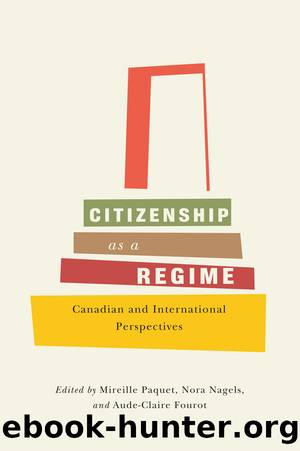Citizenship as a Regime by Mireille Paquet

Author:Mireille Paquet
Language: eng
Format: epub
Publisher: MQUP
8
From Citizenship Regimes to Protest Regimes?
PASCALE DUFOUR AND MARCOS ANCELOVICI
Making good, qualitative comparisons is probably one of the most difficult tasks of social scientists.1 Jane Jenson’s work has strongly contributed to making this task not only more feasible and rigorous but also mindful of the empirical complexity of contextualized research. Along our respective careers, as students and as professors, we have particularly thought about and used the notion of “citizenship regime,” developed by Jenson and Phillips in 1996. As the introductory chapter of this volume notes, a citizenship regime describes the way a particular state frames (legally and through public action) the relationships it has with its citizens.
As Jenson argues, a citizenship regime is a notion and not a concept.2 The difference between the two is subtle but important. A concept is a built object stabilized in a knowledge-based community at a certain point in time (like the concept of reason in philosophy or the concept of the state in political science). A notion is an intuitive understanding and knowledge of a phenomenon that synthetizes its general characteristics but has no claim to scientific quality. In this respect, the citizenship regime describes the different dimensions of the particular relationship between the state and society without presuming the qualities of these relationships, neither their origin nor their development. It provides an analytical framework that allows us to systematize the relationship between the state and citizens, which is particularly useful for comparative purposes. Notions should not be underestimated: they are the first-hand tools that comparativists use to interpret social facts across contexts and cases. They are thus the first step toward abstraction and the possibility of explanation. This is precisely where the strength of the notion of citizenship regime lies.
In this chapter, we argue that the notion of citizenship regime could be an insightful alternative to one of the main analytical concepts in social movement studies, namely the political opportunity structure (POS), and contend that variations in protest are related to variations in citizenship regimes. The first section of the chapter is devoted to the theoretical dimension of the argument. The chapter then presents one type of mobilization and protest in three societies: housing struggles in France, Quebec, and Ontario. Finally, it outlines the distinct housing regimes in each society and introduces some hypotheses linking protest and regimes.
The data used for this chapter are preliminary, mainly based on available documentation, and further research is needed to be able to reach sounder conclusions. What we put forward here is more a research agenda, inspired by the notion of citizenship regime, than a full-blown argument sustained by evidence. The cases have been selected mainly on the basis of our previous research and expertise to illustrate the scope of our general argument. We distinguish between Quebec and Ontario, following Jenson’s (1998) argument about the existence of two citizenship regimes in Canada. Furthermore, Dufour (2013) and Grundy and Smith (2005) have demonstrated that in terms of social movement campaigns, networks of actors have not been pan-Canadian but rather have been much more organized by provinces.
Download
This site does not store any files on its server. We only index and link to content provided by other sites. Please contact the content providers to delete copyright contents if any and email us, we'll remove relevant links or contents immediately.
International Integration of the Brazilian Economy by Elias C. Grivoyannis(111059)
The Radium Girls by Kate Moore(12028)
Turbulence by E. J. Noyes(8049)
Nudge - Improving Decisions about Health, Wealth, and Happiness by Thaler Sunstein(7706)
The Black Swan by Nassim Nicholas Taleb(7129)
Rich Dad Poor Dad by Robert T. Kiyosaki(6632)
Pioneering Portfolio Management by David F. Swensen(6300)
Man-made Catastrophes and Risk Information Concealment by Dmitry Chernov & Didier Sornette(6019)
Zero to One by Peter Thiel(5802)
Secrecy World by Jake Bernstein(4753)
Millionaire: The Philanderer, Gambler, and Duelist Who Invented Modern Finance by Janet Gleeson(4478)
The Age of Surveillance Capitalism by Shoshana Zuboff(4292)
Skin in the Game by Nassim Nicholas Taleb(4248)
The Money Culture by Michael Lewis(4207)
Bullshit Jobs by David Graeber(4190)
Skin in the Game: Hidden Asymmetries in Daily Life by Nassim Nicholas Taleb(4006)
The Dhandho Investor by Mohnish Pabrai(3764)
The Wisdom of Finance by Mihir Desai(3747)
Blockchain Basics by Daniel Drescher(3582)
